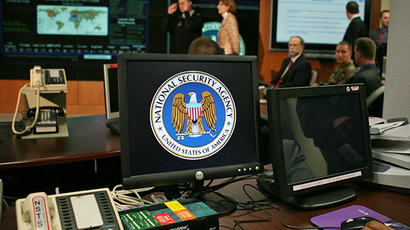US spies seek to lure private companies like Uber into collaboration

The US Office of the Director of National Intelligence wants to make it easier for private, “uncleared” companies, which don’t usually aid the intelligence community (such as ridesharing company Uber) to contribute to next generation surveillance needs.
The strategy to encourage unconventional partners to collaborate with intelligence agencies is part of a recently released, unclassified roadmap that outlines the future of data analysis. The “Enhanced Processing and Management of Data from Disparate Sources,” as the plan is called, explains six areas that the Office of the Director of National Intelligence (ODNI), led by James Clapper, believes will be crucial for surveillance community in the near future.
“One of our goals for the coming year is to try and extend our outreach via whichever trade associations are willing to take it on, into the uncleared community as well,” David Honey, the ODNI director of science and technology, told Nextgov.
“That’s why getting this information on to the ODNI’s open website was so important to us. We want to have that outreach to the nontraditionals to include the uncleared performer community so that they can gain insight into what the challenges are that we face so that they can come forward with ideas.”
READ MORE:License to snoop: Court revives NSA spy program through December
Accessing private sector research and syncing it with ODNI threat assessments for the future means "the right technology will be ready at the right time at the right price," Nextgov reported.
For example, ride-sharing company Uber could offer the government tools that could be molded to fit intelligence-gathering needs, Honey said.
“Maybe they’ve got scheduling algorithms that would help us with our logistics problems,” he said. “If we can leverage those kinds of tools, maybe we gotta adapt them a little bit, but that certainly beats having to go and pay for those things from scratch.”
Some areas ODNI is seeking to develop, according to Nextgov, include: "expertise in determining the biases of social media site moderators, geolocation in the presence of encryption, room temperature quantum computing, and immersive virtual world user experience."
NSA pledges to eventually delete old bulk surveillance records http://t.co/Gf95ToYBtbpic.twitter.com/hmOVuxwm5c
— RT America (@RT_America) July 28, 2015While the intelligence community’s go-to technology development firms are reliable partners, Honey said some of the nontraditional players have the luxury of thinking outside intelligence-gathering frames that could lead to applications valuable to ODNI.
Honey said US intel agencies and those reliable partners are crowdsourcing updates to their five-year science and technology strategy in order to match ODNI needs with corporate projects via a classified website.
Spy agencies “need to be able to post the challenge in a way that the system automatically alerts the right technology suppliers,” Honey said, adding “if you’re a technology provider and you are posting new solutions, the solutions need to be able to find their way to the customer” with ease. With that in mind, he said ODNI may create an unclassified public online portal for those without a security clearance to offer suggestions for the strategy.
READ MORE: US ex-intelligence chief on ISIS rise: It was 'a willful Washington decision'
Honey said ODNI will gather interested businesses next week to begin developing ways to measure the intel community’s progress in addressing their five-year strategic plan.
“If you are too close to the classified information, you are going to try to create a faster horse,” Honey said. “Quite often, people who have just a general knowledge of what we’re trying to do are in a better position to help us think about new solutions, than those who are deeply ingrained in the machine.”
The Obama administration has requested $53.9 billion to fund the ODNI in 2016.















